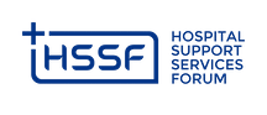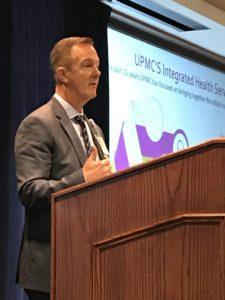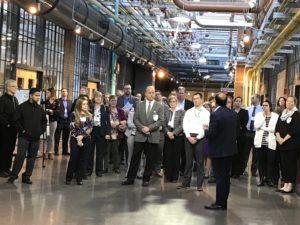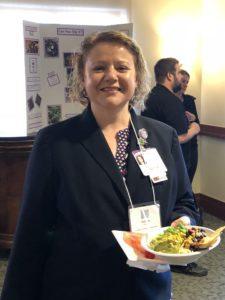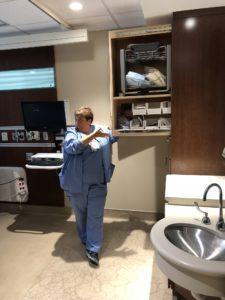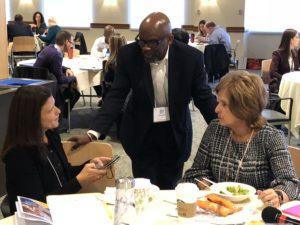2018 Annual HSSF Conference Hosted by UPMC: UPMC Impresses Guests with Vision, Innovation, and Patient CareIn October 2018, eighty support services leaders met for three days to learn, exchange ideas, network and recharge their batteries at HSSF’s 2018 Executive Conference, hosted by University of Pittsburgh Medical Center (UPMC). The theme was “Exploring the Frontiers of Excellence”. The guests convened at UPMC facilities in Pittsburgh including Shadyside and Presbyterian Hospitals, the Energy Innovation Center, and the system’s headquarters atop the US Steel building. They hailed from 30 larger hospitals or systems in the US and Canada and oversee such disciplines as EVS, food and nutrition, security, facilities, construction, supply chain, and patient transport. Our host was John Krolicki, VP Facilities and Support Services. He was supported by his team from the major support services disciplines. Many thanks to all, and in particular Simone Frerk, Executive Director Food and Nutrition Health Services, and Val Alksnis, Senior Director EVS. UPMC Support Services on DisplayUPMC had much to showcase given its 40 hospitals, 85,000 employees, numerous ambulatory facilities, 4800 employed doctors, and recognition on US News and World Report’s 2018-19 Honor Roll. It is a diversified business with four divisions: health care, health insurance, commercialization, and international operations. How does a system of this size manage support services? In his presentation, John Krolicki described an organization built on clinical and support service lines, with central coordination of EVS, food and nutrition, and maintenance, and local management of staffing, budget and operations. Val Alknis, Senior Director EVS, talked about system-wide EVS programs focused on associate and supervisor development, application of standardized best practices, and customer service training. One innovative program is “Gemba Day”, in which EVS managers take a day each month to work side-by-side with front line staff. To learn about another EVS program, we toured the Energy Innovation Center (EIC) in downtown Pittsburgh. This renovated, LEED Platinum facility is shared among organizations wishing to advance workforce development and technology innovation. In conjunction with EIC, UPMC holds 30-day EVS training sessions for local citizens needing an extra boost to join the workforce. It is proving to be a great way to fill the recruiting pipeline with trained and motivated new employees who are more likely than others hired through traditional means to stay in their jobs. Courtenay DeLuca provided an inspiring overview of the training topics.
Leaders from UPMC’s centralized Health Services Division spoke about their efforts to standardize across the system, explaining how they worked with supply chain management to achieve innovation and quality goals while reducing costs in clinical nutrition, culinary, patient services, and retail operations. Key to the strategy is collaborating with a few select vendors in a “Prime Vendor Partnership”. Simone Frerk, Executive Director Food and Nutrition Health Services, presented the plan for a community hub for healthy lifestyles to benefit employees, patients, visitors, and local residents. Features will include healthy and local food service offerings, micro markets, information, activities, and screening. Patients will be able to control ordering using app-based and other technologies. There’s much too much to explain here!
Doug Spies, Director of Planning and Design, walked us through UPMC’s plans for $2 billion in construction projects. Guests were impressed with the detail of the visioning and design processes focused on the patient experience, and the resulting use of technology to make fundamental innovations in the journeys of patients and their families. Plans for support services include off-stage flows of staff, materials, and waste. An example of innovations of interest to support services pros – many patient rooms will get 80% of their supplies via pass-through servers. Additional UPMC presenters shared information about facilities, the security department’s canine program, employee engagement, and how to successfully code malnutrition claims.
In an impressive display of their talents, throughout the conference the UPMC catering staff provided top service and gourmet dishes at the Sponsors’ Reception and Dinner as well as delicious lunches, continental breakfasts, and snacks during breaks. The dinner featured delicious meat and plant-based entrees as well as Lake Erie Perch, all made from locally supplied ingredients. Guests learned some new uses of nitrogen by patronizing the nitrogen cocktail bar. Let me take this opportunity to thank this year’s sponsors, who helped make the conference possible. They are Aethon, Gordon Food Service, Paragon Foods, Sentact, and Tru-D Smart UVC. It was a pleasure to have representatives with us at the reception and dinner. It Wasn’t Just About UPMCOne day of the conference was dedicated to UPMC as the host, the rest of the time was for guests to share what they are doing in support services. An optional day of the conference featured sessions focused on EVS, food and nutrition, and a tour of the UPMC warehouse. EVS session attendees discussed strategies for increasing HCAHPS scores, with presentations by Lara Zamajtuk from University of Florida – Shands, Jason Funyak from Christiana Care, and Mike Visniesky from Cleveland Clinic. Sessions also addressed service level agreements and standardizing policies and procedures across a network of facilities. The food and nutrition session included presentations and discussions about how to reduce tray waste, enteral feeding processes, and managing F&N in a growing system. On the last day, with all guests present, the group turned their attention to the challenge of managing service workers in a full-employment economy, a universal concern for managers who are wrestling with high employee turnover and difficulty filling open positions. We looked at some benchmark statistics collected from HSSF members regarding employee turnover for EVS, food and nutrition, and materials management. A panel interacted with the audience exploring leaders’ experiences, successful and unsuccessful. Guests went away with several creative ideas for how to cope. In the “Support Services Shorts” session, we heard from a succession of presenters who each had five minutes to present an initiative, innovation, or story. This gave guests a quick view into a topic they could explore more fully by getting in touch with the presenter after the conference.
Last but not least, we heard from Ralph Turner, Executive Director Patient Support Services at Cleveland Clinic, and Ken Grant, VP General Services, The Johns Hopkins Hospital, and VP Supply Chain Management, Johns Hopkins Health System. They spoke passionately about their careers in support services – the ups and downs; enablers and the barriers; and advice for those who want to advance to higher levels executive management. Ken’s talk was all the more meaningful because he will retire soon. He is an original founder of HSSF and a member of the Leaders’ Group. We will miss him. ReviewsAt the close of the conference, we asked guests to write down what advice they would give anyone considering attending next year’s event. Here are some unadulterated (we swear!) quotes: “Food was outstanding! Networking and breakout sessions, great! Love the tours and demonstrations. Highly recommend the Forum! Very unique and engaging.” “Go! Best value of any conference available.” “It’s a must and very worthwhile.” |
